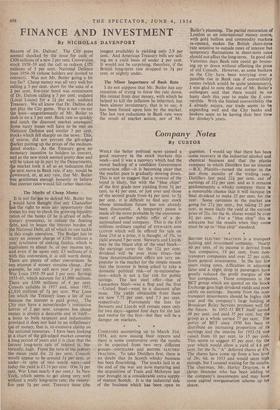FINANCE AND INVESTMENT
By NICHOLAS DAVENPORT
rket putting up the prices of the medium- ted stocks.- As the Treasury gave no monetary incentive to holders to convert, and as the new stock seemed pretty dear and will be taken up in part by the Departments, market took it all as an indication that a next move in Bank rate, if any, would be ownward, or, at any rate, that Mr. Butler as gentleman enough honestly to believe at interest rates would fall rather than rise. The Merits of Cheap Money
It is not forme to defend Mr. Butler but would have thought that any Chancellor has the right to seize any opportunity that comes his way to check the growing liquidity ratios of the banks (if he is afraid of infla- tionary pressures), to reduce the floating debt, and to lessen the interest burden of the National Debt, all of which he can tackle in this single operation. The Budget has to carry an interest charge of £580 millions a year (exclusive of sinking funds), which is equivalent to about 3s. of our income tax, and even if he saves only £3 millions of it With this conversion, it is still worth doing. There are plenty of other conversions he can attempt if money remains cheap. For
Whe can call next year 3 per cent. War Loan 1955-59 and 3 per cent. Savings 1955-65, which account for £1,000 millions. There are £390 millions of 4 per cent. .A3nsols callable in 1957 and, since 1952, 1,910 millions of 33 per cent. War Loan on which' the Treasury loses a lot of tax because the interest is paid gross). The City may have a moneylender 's instinctive horror of 2 per cent. coupons but cheap money is always a desirable end in itself— a boon to both taxpayer and industrialist provided it does not lead to an inflationary tge of money, that is, to excessive claims on the national resources. I have been looking at a chart of the gilt-edged market covering a long period of years and it is clear that the Current long-term rate of interest is, his- torically, high. From the turn of the century the mean yield for 21 per cent. Consols would appear to be around 31 per cent. or under—in spite of two world wars—and today the yield is £3.16 per cent. (On 31 per cent. War Loan nearly 4 per cent.) In New York, which seems to get along very well without a really long-term rate, the twenty- five year 33 per cent. Treasury issue (the
longest available) is yielding only 2.9 per cent. And American Treasury bills are sell- ing on a yield basis of under I per cent. It would not be surprising, therefore, if the British long-term rate dropped to 33 per cent. or slightly under.
The Minor Importance of Bank Rate I do not suppose that Mr. Butler has any intention of trying to force the rate down. His retreat from dear money, with which he helped to kill the inflation he inherited, has been almost involuntary, that is to say, it has been forced upon him by the market. The last two reductions in Bank rate were the result of market action, not of Mr.
Butler's planning. The partial restoration of London as an international money centre, with gold bullion and commodity markets re-opened, makes the British short-term rate sensitive to outside rates of interest but temporary -fluctuations in short-term rates should not affect the long-term. In good old Victorian days Bank rate could go bounc- ing up or down without affecting the price of old Consols. However, as some bankers in the City have been worrying over a possible rise in Bank rate if convertibility comes (which would be quite unnecessary), I was glad to note that one of Mr. Butler's colleagues said that there would be no hasty dash this year to make the £ con- vertible. With the limited convertibility the £ already enjoys, our trade seems to be expanding well and the City banks and brokers seem to be having their best time for donkey's years,


































 Previous page
Previous page